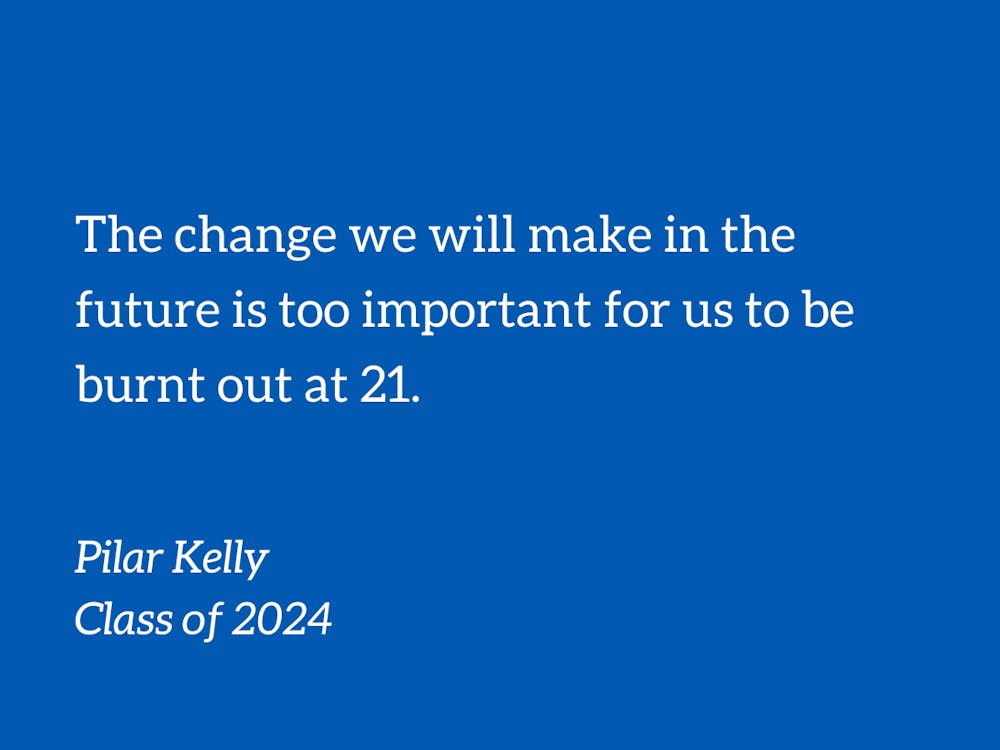The weather is getting colder, it’s getting dark earlier and the stresses of the semester are piling up. As I prepared to go home for Thanksgiving earlier this week, I couldn’t help but worry about the dark cloud of final papers and exams waiting for me on the other side. I had accepted that instead of the restful break my body and mind ached for, I would take advantage of the class-free week to get ahead of my assignments and finally start the process of applying for summer jobs and internships. There was no time to relax; in this world, if you’re not working, somebody else is.
But yesterday, as I sat down for my Communities of Practice class, Professor Andrew Nurkin had a statement projected on the board: “There is no prize for being the most burnt out.”
The class is part of the 9-month SOL program in Sanford’s Hart Leadership Program, which aims to give students the tools to be effective leaders in social change. Each of my classmates have an issue they are passionate about addressing at the systems level — educational inequality, gentrification, climate change, to name a few — and I’m sure many of us will continue to work on these problems in our adult lives. But, as Professor Nurkin pointed out, our futures in organizing, politics, or non-profit work can be a draining endeavor. Issues that require so much dedication to fix, the ones that are deeply entrenched in our institutions, require hours of energy-sapping and even trauma-inducing interactions.
We are all driven and hardworking individuals, but how can we be the best leaders in a long term struggle for change? How can we live our lives in a way that will sustain our energy over the years so that we can show up for our work and communities?
Burnout is the result of carrying long-term stress due to living in a chronic environment of pressure. This could look like a cutthroat job with long hours. It could look like a financial situation where every day is a struggle to survive. For many Duke students, it looks like challenging course loads, extracurricular responsibilities, and career expectations that make taking a break fill us with shame.
Burnout can feel like physical and emotional exhaustion, neglect of everyday necessities like eating and sleeping, or isolation from friends and family. You might lash out at loved ones or struggle to get out of bed, not wanting to face your mounting responsibilities. For me, burnout feels like a mental fog. I can’t focus on what I need to do, but I also can’t bring myself to relax without feeling guilty. I worry to myself: if I feel like this as a junior in college, how will I be successful in the real world with heightened responsibilities in both work and my personal life?
The change we will make in the future, Professor Nurkin told us, is too important for us to be burnt out at 21. So he introduced us to a concept developed by the Rockwood Leadership Institute called personal ecology, an intentional practice wherein individuals build a long-term environment for their life so that one can be resilient even as they undergo challenges in work and life. Personal ecology is the conscious decision to engage in activities that fill you with energy and love every day so that you can feel your best and show up fully in other spaces. Personal ecology is declaring our worth against systems that extract from us. Personal ecology is putting your oxygen mask on first before you turn to help others.
Everyone’s personal ecology will be different. All that matters is that it energizes you rather than exhausts you. It can mean journaling in the morning, napping mid-day or meditating at night. It can mean allocating 30 minutes every day for physical activity, even when your schedule seems inflexible. It can even mean prioritizing time with family and friends over schoolwork.
Creating a personal ecology might take sacrifice. Doing things that are good for you means taking time away from other important things. There is also, of course, an inherent privilege to personal ecology; not everyone is in the position to take a break from work and do something for themselves. However, if your personal ecology is not nourished — if you are unhappy, drained, and frustrated — your work will reflect that. If, however, you feel uplifted and motivated, buoyed by activities that fill you up, the same amount of work may be easier and take less time to do well. It’s about finding that individual balance through trial and error that will best prepare us for sustainable leadership. At this age, as we are developing work and leadership habits, it’s the perfect time to explore a personal ecology that will keep us happy and productive in the long run.
I may not completely forego schoolwork this Thanksgiving break. After all, those essays, presentations and exams are still very real. But I refuse to allow school stress to dominate a time meant to relax and spend time with my family. Instead, I’m going to figure out what my personal ecology looks like. And when school resumes, I want to continue incorporating healing practices into my everyday life. I urge you all to do the same.
Pilar Kelly is a Trinity junior. Her column typically runs on alternating Tuesdays.
Get The Chronicle straight to your inbox
Sign up for our weekly newsletter. Cancel at any time.
Pilar González Kelly is a Trinity senior and an opinion managing editor for The Chronicle's 119th volume.

